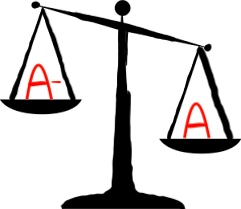
It’s a grueling experience to earn a 92.5% in a class only to realize an A is a 93%. With all of the hard work put in over the semester, it is difficult to imagine a gap of 0.5% creating a 0.34 difference in GPA for that course.
Marginal differences like that can be best explained by professors’ unique grading scales and varying thresholds for high grades. Allowing such a small difference to create a massive impact in GPA does not accurately reflect a student’s academic performance — and it hinders their potential for success.
Though the marginal differences can be a nuisance for students, they are not the source of the problem. Entrusting the faculty to freely set the bar for grades protects the intricacies of every course and leads to the best evaluation of academic performance. The issue at hand instead may be the extremely narrow grading thresholds. With grades so crucial to successful student outcomes, what reforms can be made to best reflect student performance?
At Tulane University, professor of political science Raymond Taras and visiting assistant professor of classics Andrew Lund take different approaches to address the problem.
Taras uses a 100-point scale, according to his course syllabus. But the class also notes significant changes to the thresholds. An “A” is considered 95-100%, an A- is 86-94%, a B+ is 76-85%, a B is 66-75%, a B- is 56-65%, a C+ is 46-55%, a C is 36-45%, a C- is 26-35%, a D+ is 21-25%, a D is 16-20%, a D- is 11-15% and a F is less than 11%.
On the surface level, the course may seem unbelievably easy because an A- starts at a B grade in a traditional grading course. However, Taras writes that the purpose is to ultimately “get a precise measurement of your performance in this course.”
In an interview, Taras said he adopted that scale after COVID-19 to reflect his own values. Courses and learning changed significantly after the pandemic, so his scale uses a more progressive curve: scores at the very top and bottom are difficult to achieve with narrow margins, while scores towards the middle and upper levels hold generous margins. This method guarantees that most students who put any effort into the course receive a mediocre baseline grade, while students who truly care and aim high can achieve the best grade.
Professor Andrew Lund uses a completely different approach: for the most part, he abandons letter grades. Lund uses no grading scale and instead allows students to assign themselves a grade for the course through a series of reflective essays. Lund said he grades for growth to focus on the development of the student according to learning objectives, unlike a traditional course. He said that in the humanities, there often is no right or wrong answer, and much is up to interpretation. It is thus unfair to assign grades based on concrete standards, which oftentime seem arbitrary.
Some students could abuse a system like Lund’s to give themselves a grade they do not deserve. But Lund said he reserves the right to change it as it is based on his judgment. Professor Lund’s scale comes from a successful implementation by a colleague, who inspired him to experiment with a system which encourages students to be more free and take risks. His effort coincides with the Center for Engaged Learning & Teaching’s goal of being more equitable.
Although grading scales spark significant debate among students and faculty, implementing a universitywide scale would extend the problem. Humanity courses and STEM courses differ greatly, so implementing a one-size-fits-all lens to judge student performance neglects accuracy. Faculty and administration should instead tend towards greater flexibility and student feedback, in order to test favorable grading scales that fit the course.






















Leave a Comment